See also
- Anglo-Saxon law
- Commentaries on the Laws of England (book) 1765, by Sir William Blackstone
- Common law
- English parliamentary history
- Institutes of the Lawes of England (book) 1628, by Sir Edward Coke
History of English law is the history of the legal system and laws of England.
Coverage of the history of English law is provided by:

Francis Bacon, 1st Viscount St Alban PC, known as Lord Verulam between 1618 and 1621, was an English philosopher and statesman who served as Attorney General and Lord Chancellor of England under King James I. Bacon led the advancement of both natural philosophy and the scientific method, and his works remained influential even in the late stages of the Scientific Revolution.

Sir Thomas More PC, venerated in the Catholic Church as Saint Thomas More, was an English lawyer, judge, social philosopher, author, statesman, and noted Renaissance humanist. He also served Henry VIII as Lord High Chancellor of England from October 1529 to May 1532. He wrote Utopia, published in 1516, which describes the political system of an imaginary island state.
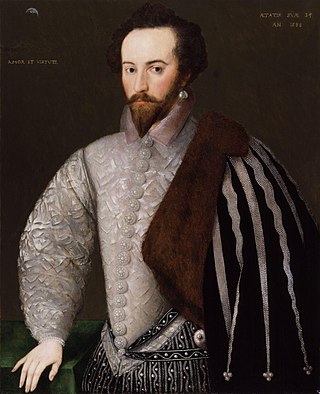
Sir Walter Raleigh was an English statesman, soldier, writer and explorer. One of the most notable figures of the Elizabethan era, he played a leading part in English colonisation of North America, suppressed rebellion in Ireland, helped defend England against the Spanish Armada and held political positions under Elizabeth I.
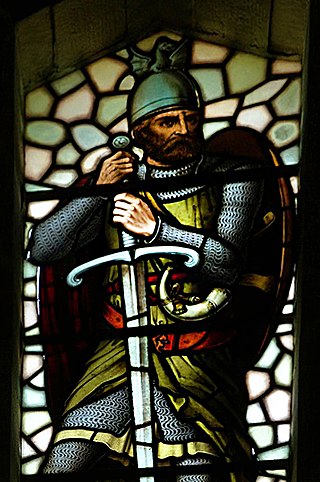
Sir William Wallace was a Scottish knight who became one of the main leaders during the First War of Scottish Independence.
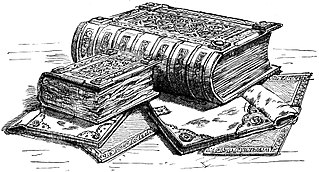
Domesday Book is a manuscript record of the Great Survey of much of England and parts of Wales completed in 1086 at the behest of King William the Conqueror. The manuscript was originally known by the Latin name Liber de Wintonia, meaning "Book of Winchester", where it was originally kept in the royal treasury. The Anglo-Saxon Chronicle states that in 1085 the king sent his agents to survey every shire in England, to list his holdings and dues owed to him.

The Rump Parliament was the English Parliament after Colonel Thomas Pride commanded soldiers to purge the Long Parliament, on 6 December 1648, of those members hostile to the Grandees' intention to try King Charles I for high treason.
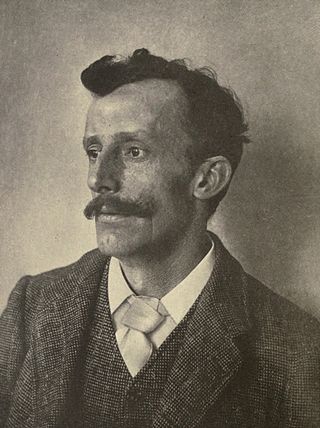
Frederic William Maitland was an English historian and jurist who is regarded as the modern father of English legal history. From 1884 until his death in 1906, he was reader in English law, then Downing Professor of the Laws of England at the University of Cambridge.

Sir Paul Gavrilovitch Vinogradoff was a Russian and British historian and medievalist.

The Commentaries on the Laws of England are an influential 18th-century treatise on the common law of England by Sir William Blackstone, originally published by the Clarendon Press at Oxford between 1765 and 1769. The work is divided into four volumes, on the rights of persons, the rights of things, of private wrongs and of public wrongs.

The Norman yoke is a term denoting the oppressive aspects of feudalism in England, attributed to the impositions of William the Conqueror, the first Norman king of England, his retainers and their descendants. The term was used in English nationalist and democratic discourse from the mid-17th century.
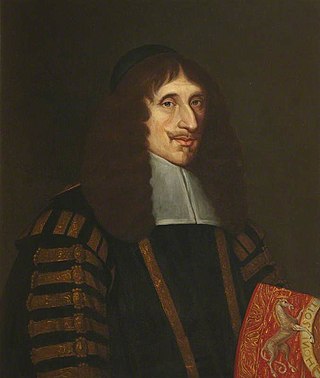
John Campbell, 1st Earl of Loudoun was a Scottish politician and Covenanter.

Sir Thomas de Littleton or de LyttletonKBSL(c. 1407–23 August 1481) was an English judge, undersheriff, Lord of Tixall Manor, and legal writer from the Lyttelton family. He was also made a Knight of the Bath by King Edward IV.
Sir Samuel Argall was an English adventurer and naval officer.

Caistor is a town and civil parish in the West Lindsey district of Lincolnshire, England. As its name implies, it was originally a Roman castrum or fortress. It lies at the north-west edge of the Lincolnshire Wolds, on the Viking Way, and just off the A46 between Lincoln and Grimsby, at the A46, A1084, A1173 and B1225 junction. It has a population of 2,601. Its name comes from the Anglo-Saxon ceaster and was given in the Domesday Book as Castre.

The Royal African Company (RAC) was an English trading company established in 1660 by the House of Stuart and City of London merchants to trade along the West African coast. It was overseen by the Duke of York, the brother of Charles II of England; the RAC was founded after Charles II ascended to the English throne in the 1660 Stuart Restoration, and he granted it a monopoly on all English trade with Africa. While the company's original purpose was to trade for gold in the Gambia River, as Prince Rupert of the Rhine had identified gold deposits in the region during the Interregnum, the RAC quickly began trading in slaves, which became its largest commodity.
Thomas Allen may refer to:
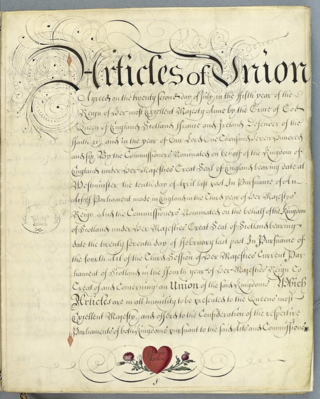
The Treaty of Union is the name usually now given to the treaty which led to the creation of the new state of Great Britain, providing that the Kingdom of England and the Kingdom of Scotland were to be "United into One Kingdom by the Name of Great Britain". At the time it was more often referred to as the Articles of Union.

The Selden Society is a learned society and registered charity concerned with the study of English legal history. It functions primarily as a text publication society, but also undertakes other activities to promote scholarship within its sphere of interest. It is the only learned society wholly devoted to the topic of English legal history.

Puck of Pook's Hill is a fantasy book by Rudyard Kipling, published in 1906, containing a series of short stories set in different periods of English history. It can count both as historical fantasy – since some of the stories told of the past have clear magical elements, and as contemporary fantasy – since it depicts a magical being active and practising his magic in the England of the early 1900s when the book was written.

Sir William Laird Clowes was a British journalist and historian whose principal work was The Royal Navy, A History from the Earliest Times to 1900, a text that is still in print. He also wrote numerous technical pieces on naval technology and strategy and was also noted for his articles concerning racial politics in the Southern United States. Despite having trained as a lawyer, Clowes had always preferred literature and writing, publishing his first work in 1876 and becoming a full-time journalist in 1879. For the services rendered in his career, Clowes was knighted, awarded the gold medal of the United States Naval Institute and given a civil list pension. He died in Sussex in 1905 after years of ill-health.